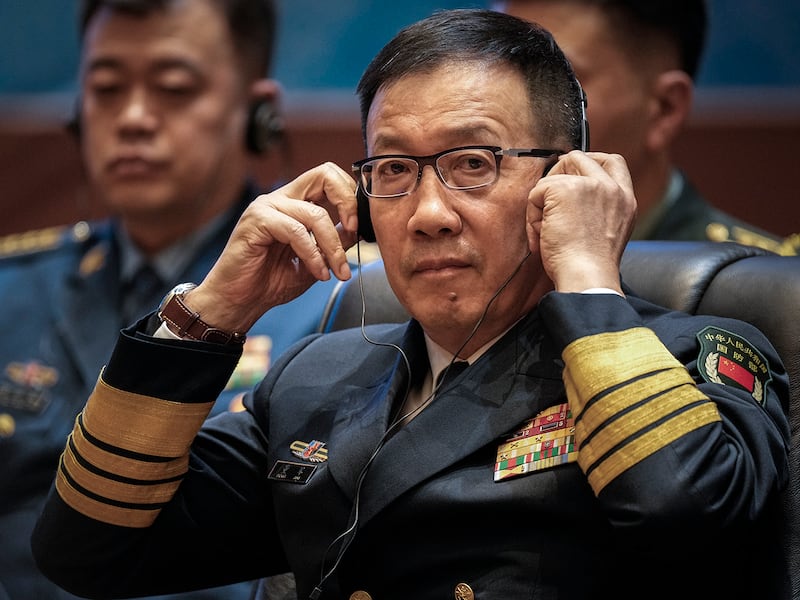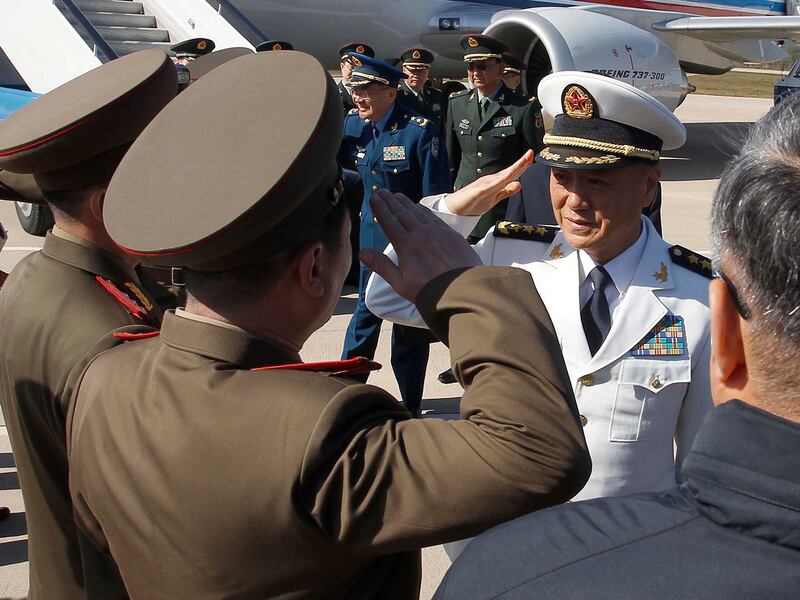The ruling Chinese Communist Party has placed Miao Hua, a high-ranking defense official, under investigation for “serious violations of discipline,” a phrase often used to denote an internal party corruption probe.
“Miao Hua, member of the Central Military Commission and director of the Political Work Department of the Military Commission, is suspected of serious violations of discipline,” defense spokesperson Col. Wu Qian told a news conference in Beijing on Thursday.
“After research by the Party Central Committee, it has been decided to suspend Miao Hua from his duties pending investigation,” Wu said.
The announcement came a day after the Financial Times newspaper reported that Admiral Dong Jun, who was named as successor to Li Shangfu in December 2023 after Li was fired for corruption, was himself being investigated for graft.
Wu dismissed the report on Thursday as “pure fabrication and rumor with ulterior motives.”
“China does not accept such reports,” he said, but gave no further details of the investigation into Miao Hua.

Current affairs commentator Cai Shenkun said Miao was taken away for investigation on Nov. 9, adding that Dong Jun is his former subordinate.
“Dong Jun was put forward [for defense minister] by Miao Hua, who recommended him to Xi Jinping,” Cai told RFA Mandarin in an interview on Thursday. “There was a lot of controversy over his appointment, because he had only ever served in the navy, and had never fought on the front line.”
He said any corruption on Dong Jun’s part was unlikely to be serious.
“He has never worked in a particularly lucrative department, and naval cadres don’t have that much power anyway,” Cai said.
He said if Dong was assisting party investigators with their inquiry, it would like be in the role of Miao’s former subordinate, and that close associates of Miao could fall with him.
Refused to meet Austin
A former admiral and commander of the Chinese navy, Dong was appointed minister of national defense in December 2023, replacing Li Shangfu who was removed in October 2023 after just seven months in office.
The last time Dong appeared in public was on Nov. 21 when he attended the ASEAN Defense Ministers’ Meeting-Plus in Vientiane, Laos.

While holding talks with the defense chiefs of New Zealand, India, and Malaysia, as well as the ASEAN secretary-general, Dong refused a meeting with U.S. Defense Secretary Lloyd Austin.
Beijing blamed it on Washington for undermining China’s “core interests” by providing weapons to Taiwan.
A native of Shandong province from where Xi’s wife Peng Liyuan also hails, Dong –- as well as his predecessor Li Shangfu -– was believed to be appointed by Xi.
Yet Dong wasn’t promoted to the Central Military Commission, the top military leadership of the Communist Party, nor was he appointed to the State Council, or the national cabinet.
In China, defense ministers are usually members of both those bodies and Dong’s non-appointment had raised questions about his position.
RELATED STORIES
Chinese defense minister under investigation: media
China’s Communist Party expels ex-defense chief, predecessor in graft probe
China’s Xi replaces commander of the country’s nuclear arsenal
Former ministers Li Shangfu and Wei Fenghe were expelled from the Communist Party for “grave discipline violations” such as taking bribes and causing great damage to the images of the party and its senior leaders, according to official statements.
Series of sackings
The investigation into Miao follows a slew of sackings at the highest levels of the People’s Liberation Army in recent months.
Just after Dong was appointed, China expelled nine military officials from its parliament, including three former commanders or vice commanders of the PLA Rocket Force, one former Air Force chief and one Navy commander responsible for the South China Sea.
Analysts said they believed that the expulsions were related to the corruption over equipment procurement by the rocket force.
But they also link the purges to ongoing dissent within the Chinese military about its readiness to stage an invasion of democratic Taiwan, which has said it has no wish to submit to “peaceful unification” under Beijing’s territorial claim on the island.
An academic who gave only the surname Song for fear of reprisals said Xi’s enthusiasm for an invasion may not be shared by actual military commanders, who fear China may not win such a war.
“Even if the current boss [Xi] wants to attack Taiwan and work with Putin to change the global order for a century to come, real soldiers and generals know whether or not such a war can be won,” Song said. “The actual military commanders are the ones who know whether their forces are up to the fight, and whether the morale is there.”

“The last two defense ministers, Wei Fenghe and Li Shangfu, were removed because they knew it couldn’t be won, and mustn’t be fought,” he said. “That, I think, is the most important reason.”
China froze top-level military talks and other dialogue with the U.S. in 2022 after then-House Speaker Nancy Pelosi became the highest-ranking U.S. official in 25 years to visit Taiwan.
The island has never been ruled by the Chinese Communist Party, nor formed part of the People’s Republic of China, and its 23 million people have no wish to give up their sovereignty or democratic way of life to be ruled by Beijing, according to recent opinion polls.
China, which hasn’t ruled out an invasion to force reunification, was infuriated by the Pelosi visit and canceled military-to-military talks, including contacts between theater-level commanders.
President Joe Biden persuaded his Chinese counterpart, Xi Jinping, to resume contacts in November 2023, when they met on the sidelines of an APEC summit in Woodside, California.
Translated by Luisetta Mudie. Edited by Malcolm Foster.
